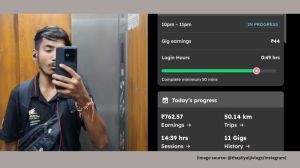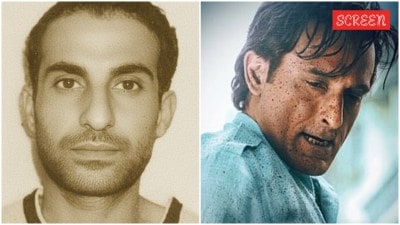Delhi riots: HC denies bail to 10 who have been in jail five years
The former JNU student leader is accused in the Northeast Delhi riots 'larger conspiracy' case
 Umar Khalid has failed to get relief from the sessions court thrice, twice from the Delhi HC, and had also withdrawn a bail plea from the Supreme Court. (Express File)
Umar Khalid has failed to get relief from the sessions court thrice, twice from the Delhi HC, and had also withdrawn a bail plea from the Supreme Court. (Express File)Underlining that the 2020 Delhi riots were not a “regular protest” but a “premeditated, well-orchestrated conspiracy,” the Delhi High Court Tuesday declined to grant bail to Umar Khalid, Sharjeel Imam, Gulfisha Fatima and seven others charged as conspirators of the riots.
A division bench of Justices Navin Chawla and Shalinder Kaur rejected the bail pleas of nine — Sharjeel Imam, Umar Khalid, Gulfisha Fatima, Athar Khan, Abdul Khalid Saifi, Mohd Saleem Khan, Shifa ur Rehman, Meeran Haider and Shadab Ahmed.
Putting a check on the limits of right to protest vis-a-vis the right to freedom of speech, the bench said, “If the exercise of an unfettered right to protest were permitted, it would damage the constitutional framework and impinge upon the law-and-order situation in the country. Any conspiratorial violence under the garb of protests or demonstrations by the citizens cannot be permitted. Such actions must be regulated and checked by the State Machinery, as they do not fall within the ambit of the Freedom of Speech, Expression, and Association.”
Separately, another bench comprising Justices Subramonium Prasad and Harish Vaidyanathan Shankar rejected the bail of Tasleem Ahmed, another accused in the same case, observing that they were unable to “make an informed decision” as Ahmed’s counsel only emphasised on the inordinate delay in trial, minus any submissions on the merits of the case.
The bench said “delay cannot be the sole factor for grant of bail… It is imperative for the Appellant (Ahmed) to show the Court that the factors such as delay in trial and long incarceration warrants bail under Section 43D (5) of UAPA, when coupled with the merits of the case. In the present case, the Appellant (Ahmed) has not even pressed on the merits of the case, thereby disabling this Court from perusing the material in order to make an informed decision as to the grant of bail.”
The 133-page ruling rejecting the bail plea of nine of the accused, authored by Justice Kaur, noted: “Keeping in view the nature of the allegations, and specifically the submission of the learned Solicitor General and the learned SPP that the present is not a case of regular protest/riot matter, but rather a premeditated, well-orchestrated conspiracy to commit unlawful activities threatening the unity, integrity, and sovereignty of India, it becomes the arduous task of the Court to strike a balance between individual rights and the interests of the nation, as well as the safety and security of the general public at large. Therefore, these appeals do not succeed.”
While their trial is yet to begin, the accused have spent five years in jail. Lawyers appearing for the accused had sought bail citing an inordinate delay in the trial and on the grounds of parity, since other accused had been granted bail in the case.
The ruling on the bail pleas of the nine dismissed concerns about the delay in trial and said “a hurried trial would also be detrimental to the rights of both the Appellants and the State”.
“The investigating agency has made earnest efforts to unearth the alleged deep-rooted conspiracy, as is evident from the undisputed fact that the chargesheet runs into more than 3,000 pages, with an additional 30,000 pages of electronic evidence. The State carried out a detailed investigation, which led to the arrest of several individuals and the filing of four supplementary charge sheets, with multiple accused persons charge-sheeted, and as many as 58 witnesses, including protected witnesses, whose statements under Section 164 of the Cr.P.C. were also recorded before the learned Magistrate. In such a background, the pace of the trial will progress naturally,” the bench said.
It also said that the adage “bail is the rule, refusal is the exception” is not universally applicable. “The grant of bail on the sole ground of long incarceration and delay in trial is not a universally applicable rule in all cases. The discretion to grant or deny bail vests with the Constitutional Court, depending upon the peculiar facts and circumstances of each of the cases,” it said.
On the issue of parity, the bench said that the allegations against Khalid and Imam were “grave” compared to the “limited” allegations against the other accused who were granted bail.
Natasha Narwal, Devangana Kalita and Asif Iqbal Tanha – three other accused were granted bail in June 2021 by the Delhi HC. Former Congress councillor Ishrat Jahan was granted bail in this case in March 2022.
“In the conspectus of the allegations levelled, it emerges that the role of the Appellants – Sharjeel Imam and Umar Khalid – is prima facie grave in the entire conspiracy, having delivered inflammatory speeches on communal lines to instigate a mass mobilisation of members of the Muslim community,” it noted.
The accused have been charged under various provisions of the stringent Unlawful Activities (Prevention) Act, including Section 16 which prescribes the death penalty for committing a terrorist act. Section 15 which defines a terrorist act, criminalises any act “with intent to threaten or likely to threaten the unity, integrity, security, economic security, or sovereignty of India or with intent to strike terror or likely to strike terror in the people or any section of the people in India”.
However, the provision qualifies that striking terror is by use of “bombs, dynamite or other explosive substances or inflammable substances or firearms… or any other means”.
The prosecution’s case is that a “chakka jam” that the accused allegedly conspired to organise over WhatsApp messages and “secret meetings” would also fall under the definition of “any other means”.
For seven accused, the High Court’s bail verdict comes nearly three years after they had moved for bail.
For Umar Khalid, a former student leader from Jawaharlal Nehru University (JNU), this was his sixth unsuccessful attempt at seeking bail. He has failed to get relief from the sessions court thrice, twice from the Delhi HC, and had also withdrawn a bail plea from the Supreme Court.
For Meeran Haider, too, this is his fourth failed attempt at getting bail. His bail plea was rejected twice by the sessions court. He then withdrew his bail plea from the Delhi HC in September 2024, and subsequently filed for bail in December 2024 – which now stands rejected.
Tasleem Ahmed, owner of a coaching centre and a resident of South Delhi’s Sangam Vihar, was arrested in April 2020 in another case and was then arrested in the ‘larger conspiracy case’ by the Delhi Police Special Cell in June 2020. This is his third attempt at seeking bail.
He first moved for bail in June 2021 before a sessions court, which was dismissed in March 2022. The trial court had primarily referred to statements by protected witnesses to prima facie conclude that the allegations against Tasleem are true.
His second bail plea was filed in May 2023 before the sessions court, which was dismissed in February 2024. He had sought bail primarily on the ground of parity with other co-accused who were released on bail.
He then moved the HC seeking bail in December 2024.
Saifi, Gulfisha, Md Saleem Khan and Shifa ur Rehman had completed arguments for bail twice earlier before the Delhi HC, before two different benches. However, the judges, after being appointed as Chief Justices of other High Courts, did not deliver their verdict. The four accused argued for bail a third time before Justices Chawla and Kaur.







